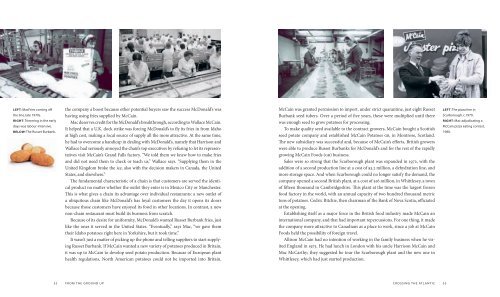From the Ground Up - McCain Foods Limited
From the Ground Up - McCain Foods Limited
From the Ground Up - McCain Foods Limited
You also want an ePaper? Increase the reach of your titles
YUMPU automatically turns print PDFs into web optimized ePapers that Google loves.
LEFt: MacFries coming off<br />
<strong>the</strong> line, late 1970s.<br />
RIGht: Trimming in <strong>the</strong> early<br />
days was labour-intensive.<br />
bELow: The Russet Burbank.<br />
<strong>the</strong> company a boost because o<strong>the</strong>r potential buyers saw <strong>the</strong> success McDonald’s was<br />
having using fries supplied by <strong>McCain</strong>.<br />
Mac deserves credit for <strong>the</strong> McDonald’s breakthrough, according to Wallace <strong>McCain</strong>.<br />
It helped that a U.K. dock strike was forcing McDonald’s to fly its fries in from Idaho<br />
at high cost, making a local source of supply all <strong>the</strong> more attractive. At <strong>the</strong> same time,<br />
he had to overcome a handicap in dealing with McDonald’s, namely that Harrison and<br />
Wallace had seriously annoyed <strong>the</strong> chain’s top executives by refusing to let its representatives<br />
visit <strong>McCain</strong>’s Grand Falls factory. “We told <strong>the</strong>m we knew how to make fries<br />
and did not need <strong>the</strong>m to check or teach us,” Wallace says. “Supplying <strong>the</strong>m in <strong>the</strong><br />
United Kingdom broke <strong>the</strong> ice, also with <strong>the</strong> decision makers in Canada, <strong>the</strong> United<br />
States, and elsewhere.”<br />
The fundamental characteristic of a chain is that customers are served <strong>the</strong> identical<br />
product no matter whe<strong>the</strong>r <strong>the</strong> outlet <strong>the</strong>y enter is in Mexico City or Manchester.<br />
This is what gives a chain its advantage over individual restaurants: a new outlet of<br />
a ubiquitous chain like McDonald’s has loyal customers <strong>the</strong> day it opens its doors<br />
because those customers have enjoyed its food in o<strong>the</strong>r locations. In contrast, a new<br />
non-chain restaurant must build its business from scratch.<br />
Because of its desire for uniformity, McDonald’s wanted Russet Burbank fries, just<br />
like <strong>the</strong> ones it served in <strong>the</strong> United States. “Eventually,” says Mac, “we gave <strong>the</strong>m<br />
<strong>the</strong>ir Idaho potatoes right here in Yorkshire, but it took time.”<br />
It wasn’t just a matter of picking up <strong>the</strong> phone and telling suppliers to start supplying<br />
Russet Burbank. If <strong>McCain</strong> wanted a new variety of potatoes produced in Britain,<br />
it was up to <strong>McCain</strong> to develop seed potato production. Because of European plant<br />
health regulations, North American potatoes could not be imported into Britain.<br />
<strong>McCain</strong> was granted permission to import, under strict quarantine, just eight Russet<br />
Burbank seed tubers. Over a period of five years, <strong>the</strong>se were multiplied until <strong>the</strong>re<br />
was enough seed to grow potatoes for processing.<br />
To make quality seed available to <strong>the</strong> contract growers, <strong>McCain</strong> bought a Scottish<br />
seed potato company and established <strong>McCain</strong> Potatoes GB, in Montrose, Scotland.<br />
The new subsidiary was successful and, because of <strong>McCain</strong>’s efforts, British growers<br />
were able to produce Russet Burbanks for McDonald’s and for <strong>the</strong> rest of <strong>the</strong> rapidly<br />
growing <strong>McCain</strong> <strong>Foods</strong> (GB) business.<br />
Sales were so strong that <strong>the</strong> Scarborough plant was expanded in 1972, with <strong>the</strong><br />
addition of a second production line at a cost of $3.2 million, a dehydration line, and<br />
more storage space. And when Scarborough could no longer satisfy <strong>the</strong> demand, <strong>the</strong><br />
company opened a second British plant, at a cost of $16 million, in Whittlesey, a town<br />
of fifteen thousand in Cambridgeshire. This plant at <strong>the</strong> time was <strong>the</strong> largest frozen<br />
food factory in <strong>the</strong> world, with an annual capacity of two hundred thousand metric<br />
tons of potatoes. Cedric Ritchie, <strong>the</strong>n chairman of <strong>the</strong> Bank of Nova Scotia, officiated<br />
at <strong>the</strong> opening.<br />
Establishing itself as a major force in <strong>the</strong> British food industry made <strong>McCain</strong> an<br />
international company, and that had important repercussions. For one thing, it made<br />
<strong>the</strong> company more attractive to Canadians as a place to work, since a job at <strong>McCain</strong><br />
<strong>Foods</strong> held <strong>the</strong> possibility of foreign travel.<br />
Allison <strong>McCain</strong> had no intention of working in <strong>the</strong> family business when he visited<br />
England in 1975. He had lunch in London with his uncle Harrison <strong>McCain</strong> and<br />
Mac McCarthy; <strong>the</strong>y suggested he tour <strong>the</strong> Scarborough plant and <strong>the</strong> new one in<br />
Whittlesey, which had just started production.<br />
52 <strong>From</strong> <strong>the</strong> g round up<br />
crossing <strong>the</strong> AtlA ntic 53<br />
LEFt: The pizza line in<br />
Scarborough, c.1979.<br />
RIGht: Mac adjudicating a<br />
<strong>McCain</strong> pizza eating contest,<br />
1980.






